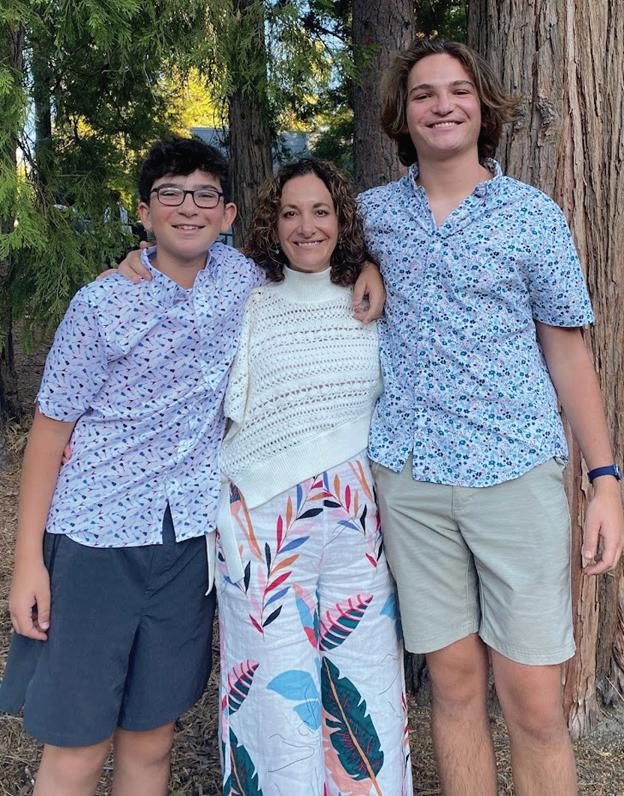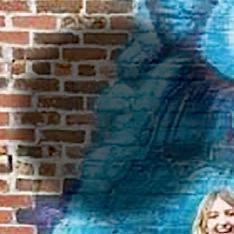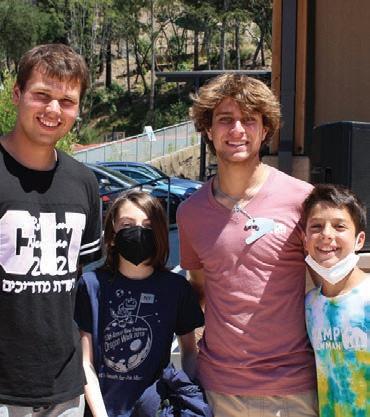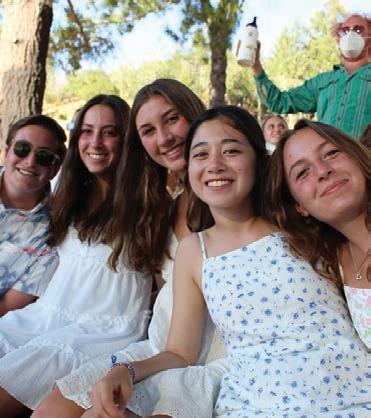
12 minute read
Sustainability away from home
praying parents bestowing their heartfelt wishes on their children before Shabbat or Yom Kippur; “Hamalach hagoel oisi ... may you be as Menashe and Ephraim (and as Sara, Rivkah, Rachel and Leah).”
Abraham, Isaac and Jacob; Sara, Rivkah, Rochel and Leah.
Advertisement
Ask someone for the names of our forefathers and mothers, and you’ll usually walk away satisfied. Ask for the names of the forefathers’ children and likewise you should be able to get a pretty quick answer. Ask for the names of the grandchildren, and now you will be hard pressed to get the correct answers.
Out of all the grandchildren, the ones you would likely hear about would be Menashe and Ephraim. These are Yosef’s two sons who were born to him and his wife, Asnat, in Egypt. They were not educated in the land of their people, nor with their family, yet they merited to have a special place in our tradition for all time.
As Jacob said in his blessing to them, “with your names shall the people bless.” Many a tear has been shed by hopeful and
CONTINUED FROM PAGE 9 follow their religious convictions and maintain their human dignity.”
Colleyville and synagogue safety
After a gunman held a rabbi and three congregants hostage at a Colleyville, Texas synagogue in January, Jewish institutions called for even tighter security at buildings that had already been hardened after the Pittsburgh synagogue massacre in 2018. And yet for some, the sight of armed guards and locked doors undermines the spirit of a house of worship. Raphael Magarik of the University of Illinois Chicago argued that the Colleyville incident shouldn’t lead to an overreaction, especially when congregations are struggling to come back together after the pandemic. Rabbi Joshua Ladon warned about the “impulse to allow fear to define our actions.” Meanwhile, Jews of color said armed guards and police patrols can make them feel unsafe. In a powerful response, Mijal Bitton and Rabbi Isaiah Rothstein of the Shalom Hartman Center wrote that Jewish institutions must think in “expansive and creative ways about how to fight for our combined safety in a way that takes into account the rich ethnic and racial diversity of our communities.”
Anti-Zionism, antisemitism and “Jew-free zones”
When nine student groups at UC Berkeley’s law school adopted by-laws saying that they
They were the hope of the people. In their migration away from the Holy Land, there was the vast unknown in front of them. How would they fare, and would they continue to inspire the next generation in these more challenging circumstances? Menashe and Ephraim were all the proof and assurance they needed. Here was a family that was torn away from their land, from their family and people, and these are their products. Sons who held strong to their values and traditions while in the bedazzled halls of Pharaoh’s palace and the depravity of Egypt. “You see,” the brothers whispered to each other, “it can be done even here.” We can still instill our families with our beloved Judaism, while we engage successfully with different cultures. There is nothing to fear.
The secret to this success story is that Yosef employed two tactics. Firstly, he held strong to his family memory and tradition. He made space for that to be the founding blocks of his home and the will not invite speakers who support Zionism, the Jewish Journal in Los Angeles ran an op-ed with the provocative headline, “Berkeley Develops Jewish Free Zones.” In the essay, Kenneth L. Marcus, who heads the Brandeis Center for Human Rights Under Law, argued that “Zionism is an integral aspect of the identity of many Jews,” and that the bylaws act as “racially restrictive covenants,” precluding Jewish participation. Defenders of the proPalestinian students countered that groups often invite only like-minded speakers, and that while being Jewish is an identity, Zionism is a political viewpoint. Faculty, politicians and activists weighed in on both sides of what has become a central debate on campuses and beyond: When does anti-Zionism become antisemitism, and how do you balance free speech rights against the claims by some students that their personal safety hangs in the balance?
“Maus” and school book bans
Caught up in an epidemic of book-banning were Jewish books for children and young adults, a list that includes “The Purim Superhero,” “Family Fletcher” and “Chik Chak Shabbat.” A Texas school board removed a 2018 graphic novel adaptation of Anne Frank’s diary. But perhaps the highest profile case of a Jewish-interest book being banned came when a Tennessee school board voted to remove “Maus” — Art Spiegelman’s epic cartoon memoir about the Holocaust — from middle-school classrooms, citing its use of profanity, nudity and depictions of “killing environment he created. Then, he got active by impacting the environment around him. Instead of being threatened by what was around him, cowering and hiding his secret background, his family became influencers. Not the TikTok type, but the leading by example type. Displaying how a true Jewish home operates, they shone their light all over a dark Egypt. This was his weapon to maintain connection with his heritage even though he was so far away and alone. To train his young family in the ways of his father. And more importantly, to thrive there as well.
And they did a fine job indeed. Still today, we bless our families — be like them! We are not in ancient Israel of old. We are dispersed throughout the world, and here in Arizona and downtown Phoenix, of course as well. But if we mimic that model, we can be assured that our own families will be proud of their identities, protect it, and proudly display it for all to see. So, make Jewish practice a bedrock of your home. Let your family see you lay tefillin, gather them as you light the Shabbat candles before sundown, make kiddush out loud (don’t forget to serve the matzah balls, the most kids.” Coverage of the ban misleadingly depicted “Maus” as an introduction to the Shoah for young adults, while Spiegelman recently noted that he had become a reluctant “metonym” for the book-banning issue. Jennifer Caplan explained why the book is indispensable: “‘Maus’ forces the reader to bear witness in a way no written account can, and the [illustrations] are especially good at forcing the eye to see what the mind prefers to glide past.”
Artificial intelligence and real-life dilemmas
Artificial intelligence, or AI, has become a fact of corporate life, with computing advances that power robotic automation, computer vision and natural-language text generation. But what captured the public imagination — and dread — this year were sites like Dall-E, which threatened the livelihood of graphic designers by generating original, credible illustrations with no more than a simple prompt, and ChatGPT, which is able to expound cogently and humanly on practically any topic. Beyond everyday ethical dilemmas (“Can I write my book report using ChatGPT?”) AI raised profound questions about what it means to be human. “Rabbis have historically been very open to the idea of nonhuman sentience and have tended to see parallels between humans and nonhumans as an excuse to treat nonhumans better,” wrote David Zvi Kalman in an essay on the prospect of creating artificial life. Similarly, Mois Navon suggested in JTA that “if a machine is sentient, it is no longer an inanimate object with no moral status or important element in this all), study Torah often, give charity generously, display your menorah for all to see and so on. Let’s proudly display our pride and our connection to our Judaism — happily, and with joy.
And then let’s change the world around us. Lead by example. Do good and you will be noticed. Do good and you will be emulated. That is how we continue the legacy. That is how we live as Menashe and Ephraim. That is how we become worthy of carrying that blessing forward.
Hamalach hagoel oisi — may G-d’s angel deliver us from all harm and may we truly be blessed, among all our brethren, Amen! JN
‘rights’ … but rather an animate being with the status of a ‘moral patient’ to whom we owe consideration.”
A Pulitzer for “The Netanyahus”
Joshua Cohen was the somewhat surprising winner of the Pulitzer Prize in Fiction for his novel “The Netanyahus: An Account of a Minor and Ultimately Even Negligible Episode in the History of a Very Famous Family.” Or maybe not so surprising: The book is a fictionalized treatment of a real-life visit in the late 1950s by the Israeli historian Benzion Netanyahu for a job interview at a university very much like Cornell. With Benzion’s son Benjamin angling for an ultimately successful return to office in real life, a satire about Jewish power, right-wing Zionism and Israeli selfregard might have seemed to the judges very much of the moment. As critic Adam Kirsch wrote in a JTA essay, Cohen concludes that both American and Israeli Jewish identities “are absurd, crying out for the kind of satire that can only come from intimate knowledge.” Others weren’t amused. Jewish Currents criticized the novel for being derivative of both Philip Roth and Saul Bellow, and the Jewish Review of Books said that the novel includes “a capsule history of Zionism that is so blatant a distortion that I just gave up.” JN
The views and opinions expressed in this article are those of the author and do not necessarily reflect the views of JTA or its parent company, 70 Faces Media.

JODI WOODNICK | GUEST CONTRIBUTOR

As holiday decorations come down all around us and we settle into frigid mornings and shorter days, most people are thinking about getting back to “real” life. Me? I’m thinking about next sum mer and the millions of kids who will be attending sleepaway camp, many for the first time.

I think (and talk) about camp all year, to anyone willing to listen. I am a therapist who works with kids and families, and I have a front-row seat to the struggles that kids face today: too anxious to try some thing new, struggling with friendships, with self-confidence, turning into puddles in the face of adversity… the list goes on. But don’t worry, there’s good news. I am also the director of community care at Wilshire Boulevard Temple Camps in California, and I have a front-row seat to the myriad ways in which sleepaway camp has the potential to help children fight against these struggles… if we allow it.

Allowing a sleepaway camp experi ence to work for your child will take some mental and emotional preparation. It starts with asking, “What do I want my child to get out of a sleepaway camp experience?” Most people say, “gain independence,” “make friends” and “have fun.” I am going to challenge you to hope for more. Camp has the potential to provide vital social and emotional skills that can benefit your child for life. My favorites are practicing problem-solving, flexibility and empathy, learning how to fail and discovering what matters in a friendship. All these things, and more, are possible.
Here are some things you can do to help:
1. Pick the right camp for your child
Does the camp have a clear mission? Do the camp’s mission and culture align with your values? (For example, if the camp is religious, but your child hasn’t had much exposure to religion, will they feel comfortable? If the camp’s programming is heavily sports oriented but your child doesn’t like competition, will they find common ground with other campers? Will your LGBTQ+ child feel accepted and valued?) Is the camp team responsive and communicative? Does the camp have programming to address your child’s unique needs? These questions and more are what you should consider as you search for the perfect camp. Also, while it can be helpful to talk to others to gather information, please do not base your decision on who else or neighbor is doing the same is a set-up for failure.
2. Consider your child’s age

For a typical child, starting camp at age 8-10 is ideal but kids can be successful starting at any age. If you end up starting your child at age 11 or older, just prepare for a slightly longer adjustment period than for that of a younger child. Also, older children tend to be more selfconscious about feelings associated with adjusting to camp and may therefore be less likely to open up to cabin mates or counselors.

3. If you want your child to go, just sign them up
When asked, most of us (especially kids) will reject the unfamiliar. If sending your child to sleepaway camp is important to you, it’s ok to simply tell your child they’re going. Just like you wouldn’t give them a choice about going on a family vacation or to a loved one’s celebration, you do not have to give them a choice about camp.

4. Communicate openly and honestly (and early) with the camp about your child’s behavioral, emotional and/or academic challenges
Many parents think that because camp is
“fun” extreme behaviors and emotions that happen at school won’t materialize at camp. Unfortunately, the opposite is often true. Camp is a highly structured environment where every waking moment has social, emotional and/or behavioral demands. Many camps have mental health professionals on staff to work together with parents, counselors (and your child’s teachers/therapists, if necessary) to create and supervise comprehensive accommodation plans (see step 1). The more prepared the camp is for your child, the better their chances for success. Withholding vital information (or sharing it at the very last moment) only sets your child up for failure.
On a related note, please don’t change or stop your child’s medications during camp. Camp, while magical and transformative, can also be stressful. Dealing with changes to medications while adjusting to camp life may add to stress.
5. In the months leading up to camp, provide opportunities for your child to practice independence and self-advocacy
Although there is plenty of support, sleepaway campers need to be able to help themselves in many ways. They should be able to shower without assistance, serve themselves food, be able to identify their own belongings and put their dirty clothes in a laundry bag. They will even be expected to make their bed. Have your child practice as many of these things as you can at home before camp. It will significantly reduce their stress if they don’t have to learn all of this for the first time while also learning the ropes at camp. More importantly, sleepaway campers need to be able to advocate for themselves. Counselors, while fabulous, are not mind readers. Give your child opportunities to use their voice and witness firsthand the power of self-advocacy. Let them order for themselves in restaurants, ask a store clerk for help, ask the teacher a question or tell a friend what’s bothering them. This practice will help them to communicate when and if they need help at camp and parents aren’t there to speak for them.
6. Get comfortable with discomfort
The first time they go to camp, most children will experience some nervousness. They may even cry or have trouble sleeping at first. As difficult as this is, know that this is the kind of discomfort that leads to growth. Working through discomfort now will set your child up for working through adversity throughout their life; on the playground, at the choir performance, their first break up, college. This might sound hyperbolic, but it couldn’t be truer.
You can help by normalizing homesickness, and helping your child come up with a plan for how they will deal with it when and if it does happen. Who at camp can they talk to? What are some things they can do to help themselves fall asleep or calm themselves down (breathing exercises, etc.)?
As departure day gets closer, and nervousness intensifies, you may feel tempted to negotiate with your child to get them on the bus, saying things like, “If you don’t like it after three days, I’ll come pick you up.” Please do not do that. There is nothing worse you can say if you want your child to fully engage. Now they know they don’t have to.
Meanwhile, prepare yourself for letters that may be alarming, that feel desperate. Don’t panic. If that happens, call the camp to discuss strategies and options. The camp is your partner in supporting your child and their success at camp.
7. Trust the camp
You researched, attended meetings and spoke to staff. You chose this camp for a reason. Now let them do what they do best. When you do things like setting up secret codes with your child for the camp photos, sneaking covert cell phones into their luggage or questioning staff on opening day about bunk requests, you send the message that the camp can’t be trusted with your child’s best interest. If you don’t trust the camp, why should your child?
Yes, sending your child away to someone else’s care is a leap of faith and that is scary for any parent. Your camp does not take your faith in them for granted. Partner with them.
8. Trust your child
In the end, your child needs to know that you genuinely believe that they can do it. Even if it’s hard, even if it’s scary, they can do it. The way I see it, scary just means something great is about to happen. JN










